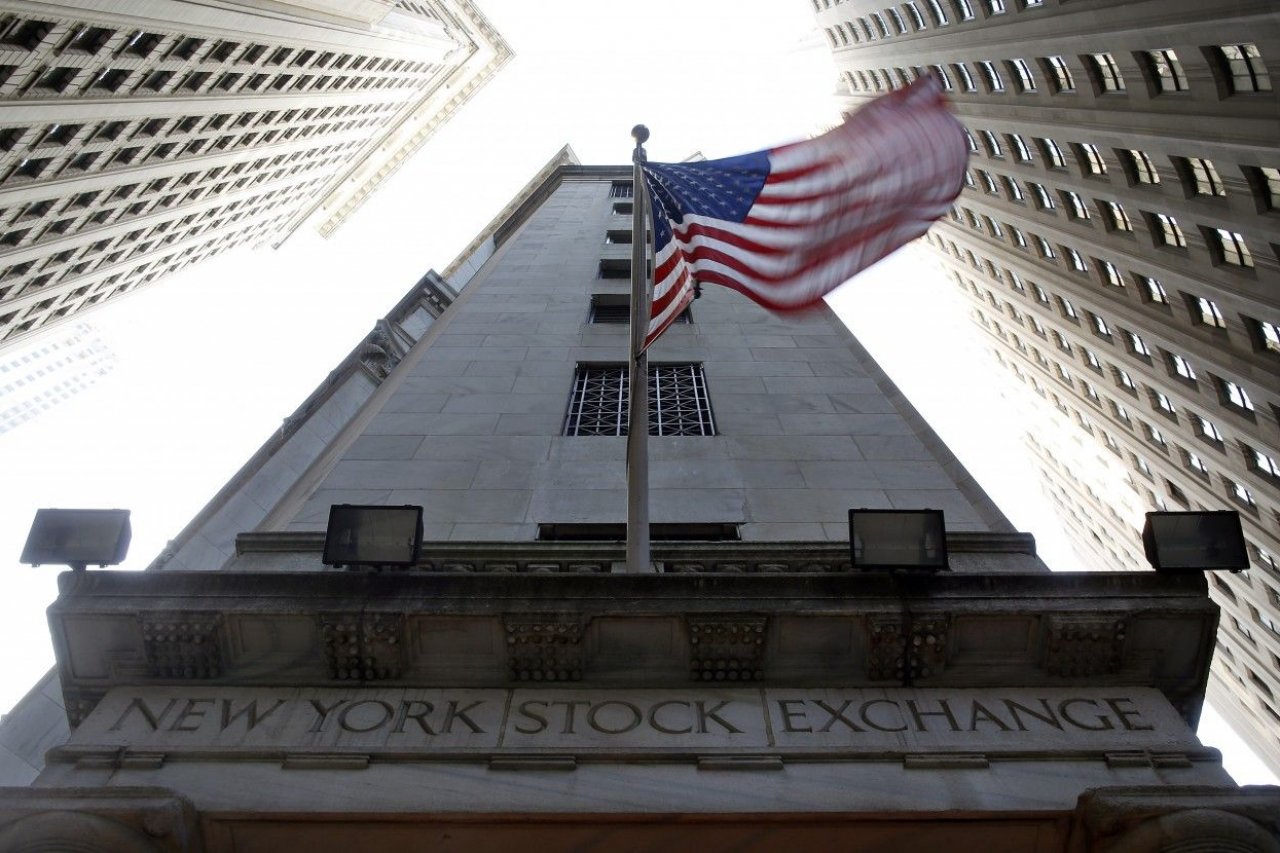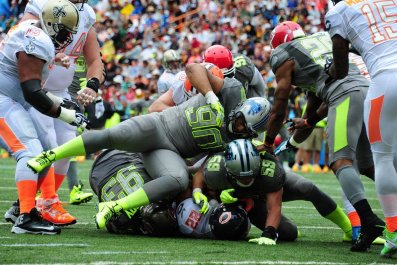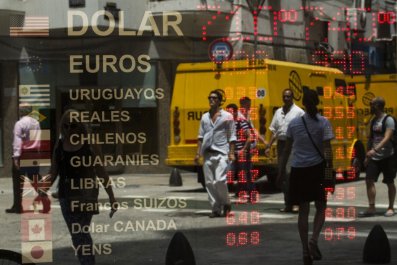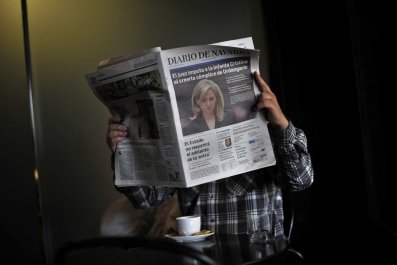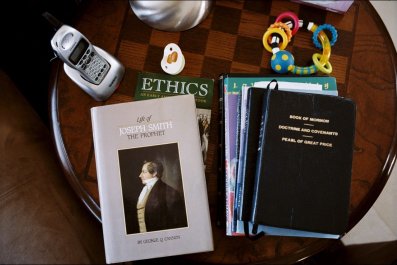Gregory Lynam was watching President Obama's helicopter land at the White House several blocks away from his 12th-floor office when his desk phone rang. A middle-aged man speaking nervously in a vaguely European accent identified himself as "John," then blurted out a secret: He knew the inner workings of a multibillion-dollar tax-evasion scheme by his employer, a Fortune 500 company.
Lynam, a tax lawyer who specializes in corporate whistle-blowers, knew instantly that the ridiculously fake name was a promising sign. No legitimate snitch immediately discloses his true identity.
Words tumbled out from John's end of the line. "I've worked for this company for a long time and we've always done the right thing," he babbled, mentioning arcane things like "tax accrual work papers" - confidential documents that indicate he was a senior member of the company's internal tax team. "I worked on these transactions and I told my boss they weren't right, but they did them anyway!" He said he didn't want to meet Lynam or his colleagues at the Ferraro Law Firm in person, because his company's outside attorneys, a white-shoe law firm, were just blocks away from Lynam's office.
Steering to topics he was sure John already knew about - "just to get him more comfortable" - Lynam described the Internal Revenue Service's special program, created in late 2006, to award corporate whistle-blowers 15 percent to 30 percent of tax frauds totaling at least $2 million. He also touched upon the bad news: the arduous, black-box process of submitting a claim, and the near-certainty that even if the IRS didn't screw things up, any bounty wouldn't hit a bank account for five to seven years.
Within hours, John had morphed into a potentially lucrative client for Lynam and Ferraro, which after three decades of big-dollar wins for asbestos and mesothelioma victims is aggressively pushing tax claims by company tattletales. By the end of that February 2011 day, he had faxed back a retainer agreement and agreed to be represented by Lynam, who recounted the phone call in a recent interview, but declined to name the man, his company or even his nationality.
High-level whistle-blowers are the newest players in the vastly rich world of offshore tax evasion. The tax gap - the amount by which U.S. corporations underpay their federal income taxes - is $385 billion, according to the most recent IRS estimates in 2006. But deep inside multinational financial services, technology and pharmaceutical corporations, and at smaller family-run companies in everything from manufacturing to real estate, high-level insiders are stealthily exposing them.
Nailing these cheaters is a nascent game fraught with risk and disappointment, but carrying the promise of astronomical payouts.
Headlines about offshore tax-dodging in recent years have focused on wealthy individuals swept up in an American crackdown on Swiss and Swiss-style banks, and on analyses from think tanks like Citizens for Tax Justice on the astonishingly low, and in some cases, negative, taxes paid by household names, from General Electric, Verizon Wireless and Wells Fargo to energy companies like Pepco Holdings and Duke Energy.
Lynam says that as sophisticated cross-global tax strategies proliferate, the rewards for catching the tax cheats may be even bigger. "We think the tax gap is actually in the trillions of dollars," he says. "If we can find multibillion-dollar issues on a handful of Fortune 500 companies, what about the rest of them?"
There's now a clutch of lawyers taking clients on a contingency-fee basis and charging up to 40 percent of the rewards for corporate tax tipsters. "We have clients with whistle-blower claims for billions of dollars in unpaid taxes," not including penalties and interest, says Eric Havian, a lawyer at Phillips & Cohen in San Francisco. "The multinationals with offshore operations are the ones where you see some of the biggest tax scams." Lynam says Ferraro represents more than 100 whistle-blowers with claims alleging $120 billion in tax dodging.
These tax-code whistle-blowers are often motivated by moral outrage, but many are angry at cash-rich employers who have stiffed them on bonuses, passed them over for promotions or branded them "wimps" for refusing to participate in the subterfuge. Most of all, they covet the same thing their tax-evading companies do: money, and lots of it.
Like shipwreck salvagers trawling for ancient treasure, even outside investors are eyeing the huge potential payouts here. Insiders say that London-based litigation financing firm Burford Capital is among those fronting some of the cost of filing the mountain of paperwork supporting claims of malfeasance. Christopher Bogart, chief executive and co-founder of Burford, says he treats the claims as "contingent assets, which have value but a higher risk-profile."
Ah, the risk.
Getting a cash reward from the IRS is like playing the Powerball lottery. Very few have yet to score, in part due to a byzantine bureaucracy, in part because the program began seven years ago and claims can take that long to pay out. "It's a very tough row to hoe," says Bruce Zagaris, a tax lawyer at Berliner, Corcoran & Rowe in Washington, D.C., with a few dozen bounty-hunting clients. Ralph Sutton, chief investment officer at Bentham IMF, a litigation financing firm, says that "we look at these cases occasionally, but they're really difficult to invest in."
Tipsters also risk retribution. Lynam says one client on the West Coast who worked for a small pharmaceutical company was followed by a black Chevy Suburban for days last year after filing a claim alleging around $5 million in tax evasion by a small, family-controlled pharmaceutical company. The client asked the FBI to investigate. "There are a lot of guns out there in the Pacific Northwest, and this guy felt physically threatened," Lynam says, adding that the client moved to another state.
But those who win score big. "Some people are going to become very wealthy through this process," says Bryan Skarlatos, a tax lawyer at Kostelanetz & Fink in New York with around three dozen bounty-hunting clients with claims totaling tens of billions of dollars.
The biggest jackpot went to Bradley Birkenfeld, the former UBS private banker who admitted to smuggling diamonds in a toothpaste tube on behalf of a tax-dodging American client but then turned against the Swiss bank and laid out for federal prosecutors its tax-dodging work for offshore clients. Birkenfeld spent nearly three and a half years in a federal prison for his role in helping Americans dodge taxes through UBS's offshore private bank, but one month after he got out, in August 2012, he was handed a $104 million award from the IRS - known as a 7623(b) payout. His tattling on Switzerland's second-largest bank, which in 2009 paid a $780 million fine for its private banking shenanigans, had paid off.
The IRS made its first 7623(b) payout in 2011 - $4.5 million to an in-house accountant at an unnamed financial-services firm. Stephen Whitlock, the director of the agency's whistle-blower office, told an industry conference on January 23 that about $50 million was paid out last fiscal year. A big chunk of that went to a client of Ferraro, which secured a $38 million award last October for an insider who outed a tax-avoidance scheme at one of the nation's largest corporations. Lynam declined to name the insider or his company, saying only that it "wasn't a tech or pharma firm." Phillips & Cohen, Havian's law firm, won a $2 million bounty last October for a confidential mole at a Wall Street investment bank known publicly only as "Mr. ABC." It was the third award for the mole, who outed an aggressive tax strategy at Illinois Tool Works, a maker of automotive, construction and food processing equipment.
From 2007 through 2012, 1,967 bounty hunters submitted tax-evasion claims on 11,372 companies, IRS data shows. While submissions to the special program peaked in 2009, at 279, the number of companies outed has varied widely, possibly suggesting that some claims come from tax snitches inside Wall Street banks who work for multiple clients or that the snitches have changed jobs.
"The IRS is almost impossible to deal with - they build a firewall between you and what they are doing," says M. Thomas Martin, president of the Corporate Whistleblower Center - a lobby in Washington that is part of America's Watchdog, a consumer advocacy group of which Martin is also president.
There have been many more payouts in recent years from less lucrative IRS programs that reward the exposure of financial shenanigans that don't directly concern tax, such as kickbacks, bid-rigging and price fixing; and tipping off the Securities and Exchange Commission to insider trading and Ponzi schemes.
Tax lawyers hope more special payouts are in the pipeline, given that the program only began in December 2006 and many claims are now winding their way through the final stages of the process. They say that as the IRS struggles to ferret out corporate tax abuses, whistle-blowers in corporate tax departments hold the key. It's not enough to have suspicions, anger or moral outrage - the IRS needs confidential internal work papers that drill down on what the federal tax returns of the companies bury or hide altogether.
"If you don't have those, we don't have much to talk about," Havian says. Skarlatos argues that as gray areas in tax law are tackled in court cases over the next decade or so, whistle-blowers coming out now will be in a strong position. "It's going to become a common tool of tax enforcement," he says.
In a December 6 private letter to Senator Charles Grassley, R-Iowa, who is a frequent critic of the slow pace of the IRS whistle-blower program, John Koskinen, now the IRS commissioner who was then the nominee, wrote that if confirmed, he planned to "improve" the program's "reach and communications with existing and potential whistle-blowers." Grassley tells Newsweek that while five years for payouts is common, "the IRS should be working to reach agreement and resolve issues quicker."
The IRS did not respond to requests for comment.
Another potential boost: a 2010 IRS rule that unwittingly gave whistle-blowers glimpses into tax shelters that push legal boundaries. The rule requires companies with such strategies to file broad annual disclosures, along with their annual tax returns, flagging so-called uncertain tax positions, meaning sketchy transactions that could be challenged by the IRS. The key thing for whistle-blowers with insider knowledge and, critically, the documents to back it up: The disclosures, known as Schedule UTPs, are so broad and vague that they rarely provide any specifics about a company's tax dodging or prompt an IRS audit.
While the rule initially applied to companies with at least $100 million in assets, this year it extends to corporations with at least $10 million in assets.
Companies filing the disclosures set aside "reserves" for potential future tax bills on their SEC filings. The reserves, known in accounting terms as "unrecognized tax benefits," can both lower their current tax federal income tax bills and create a future honeypot if the IRS ultimately fails to find anything untoward.
"The fact that companies are refusing to provide even the minimal level of detail the IRS requires is fertile ground for whistle-blowers," Havian says. The reason: With the disclosures, companies are giving off a faint whiff of something potentially aggressive that the IRS doesn't stand a chance of figuring out without access to those internal tax-planning documents that the whistle-blower has squirrelled away.
The IRS rule," he says, "has driven less honest companies underground."



